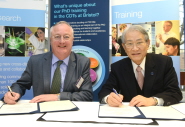A high-powered contingent from Kyoto Universitytravelled to Bristol this week [9 to 11 January] to discuss how the latest thinking and technologies could solve some of the planet’s biggest challenges.
This is believed to be the biggest symposium of its kind ever to be held in the UK, reflecting the growing importance of international partnerships to tackle global research problems.
Kyoto University is one of the top global research universities and is highly-regarded for its academic excellence, being placed 20th in the Times Higher Education World Reputation Rankings. It has produced eight Nobel Prize laureates, including Professor Shinya Yamanaka, who won the Nobel Prize in Physiology or Medicine in October 2012.
Among those who are discussing how both universities can share knowledge, resources and links with industry are His Excellency Keiichi Hayashi, the Japanese Ambassador to the UK, and Bristol Mayor George Ferguson.
Joint research projects are focussing on major issues such as predicting and tackling natural disasters, the development of interactive robots and using technology to improve medical treatment.
World-leading experts in natural disasters will share knowledge, data and facilities to find ways to better predict and guard against threats from earthquakes, flooding and other hazards such as volcanic ash.
Professor Paul Bates, Director of the Cabot Institute at the University of Bristol, explained: “This collaboration brings together leading thinkers in the field of natural hazards from both Japan and Britain – two countries with a strong desire to reduce the risk of harm to their people, infrastructure and economy by planning better for the future.
“We hope to gain a better understanding of how the frequency of natural disasters might change, how we can engineer structures to be more resilient and also how the population responds in such circumstances. It’s exciting to be sharing knowledge and ideas with internationally renowned researchers and we hope to bring about some tangible solutions to ensure we’re well-equipped to deal with such disasters in the future.”
There are also exciting developments in the field of ‘translational medicine’, which addresses how laboratory discoveries can be used to create new ways of diagnosing and treating patients.
Academics in Kyoto have developed a new system for healing wounds based in artificial skin and a new titanium implant for helping to heal spinal injuries – both innovative findings which can be developed for use in Europe.
Professor Lars Sundstrom, Director of the Severnside Alliance for Translational Research at Bristol University, explained: “We hope to develop these for use in Europe as new treatments through our clinical academic research groups. This also brings us in direct contact with Japanese companies that work with Kyoto University, thus extending our reach and building privileged links with the Japanese medical device industry which we could never do on our own.”
The Bristol-Kyoto partnership also represents opportunities to attract external investment, opportunities for academic and student exchanges, and the chance for both universities to benefit from existing relationships with industry.
Professor Guy Orpen, Pro Vice-Chancellor for Research and Enterprise at the University of Bristol, said: “The partnership with Kyoto University is extremely exciting because it brings together each country’s foremost thinkers to tackle issues which have a very real impact on societies around the world.
“Ours is a unique relationship which we hope will harness the research excellence at both institutions, alongside collaboration with industry, governmental and other partners to produce solutions to meet the intellectual and societal grand challenges of the 21st century.”
The purpose of the two-day symposium is to build on what existing joint research projects have achieved, develop new relationships and future collaborations. They are sharing practice in supporting research and innovation through their professional support services, especially technology transfer and multi-partner open innovation.
Collaborative research is taking place across a wide range of disciplines, from economic theory to English literature and potential applications for stem cell biology. There is also intellectual debate of a range of areas including economic theory and Asian international history.
Dr Hiroshi Matsumoto, President of Kyoto University, said: “It is my sincere hope that in addition to providing a platform to establish education and research cooperation, the first Bristol–Kyoto Symposium will provide an opportunity for scholars from both institutions to share their dreams and aspirations, and inspire one another to reach for those areas of knowledge which are as-yet within the realms of ‘pre-science’, and which await discovery and exploration by courageous scientific minds.”
The Bristol-Kyoto Symposium is partly sponsored by the Engineering and Physical Sciences Research Council’s (EPSRC) Building Global Engagements in Research (BGER) programme, which seeks to build capacity within UK research centres for international engagement.
For further information on the Bristol-Kyoto Symposium, please see here.

